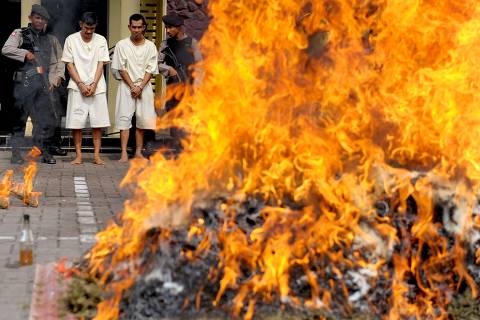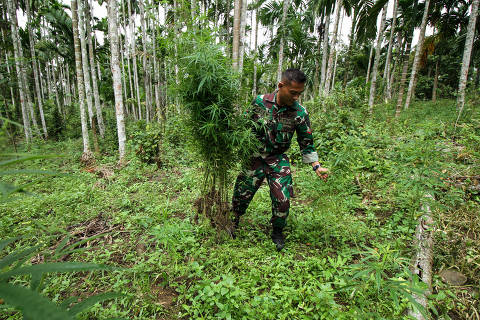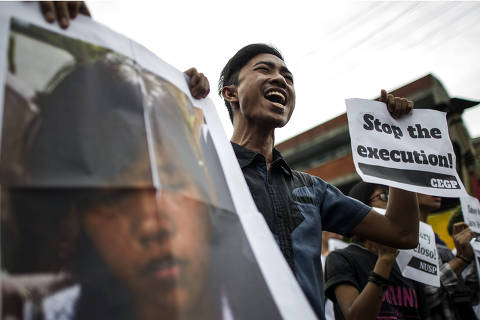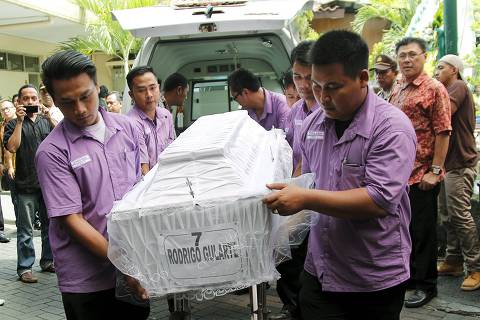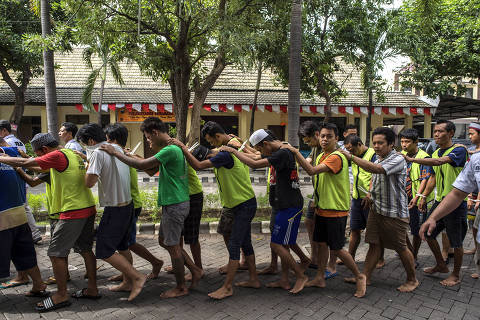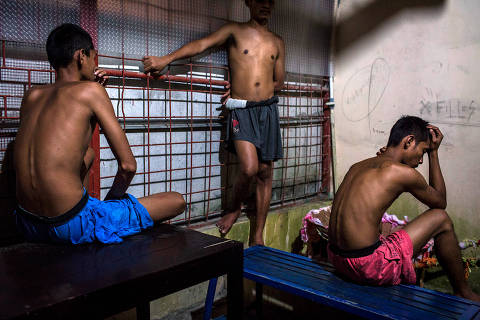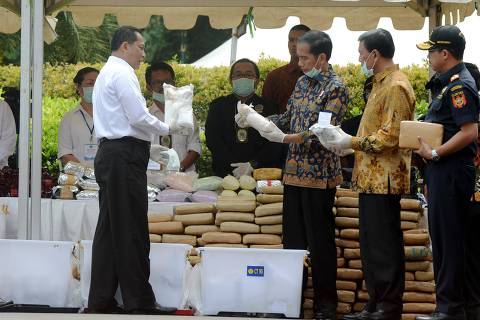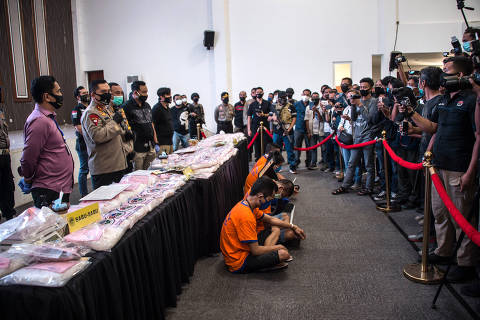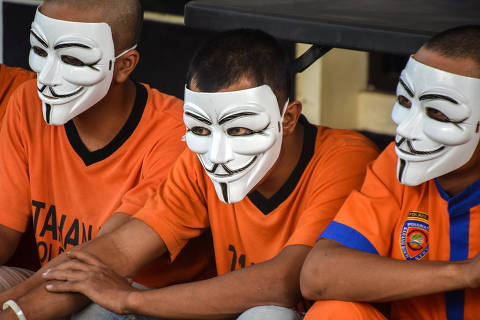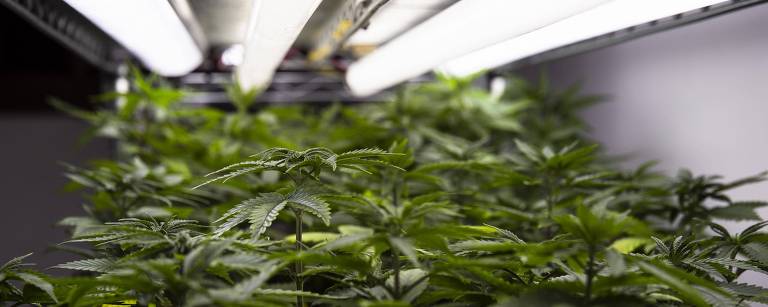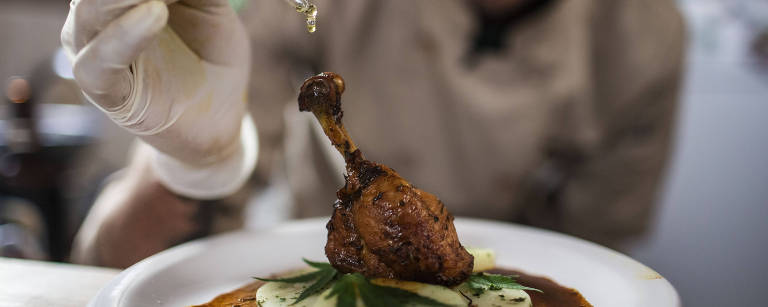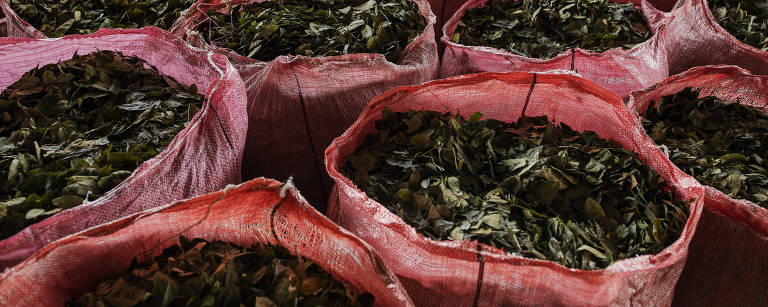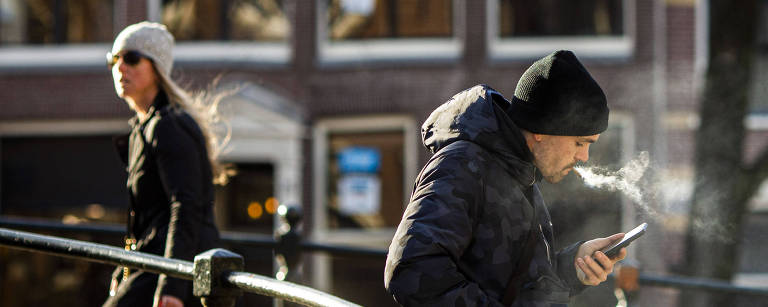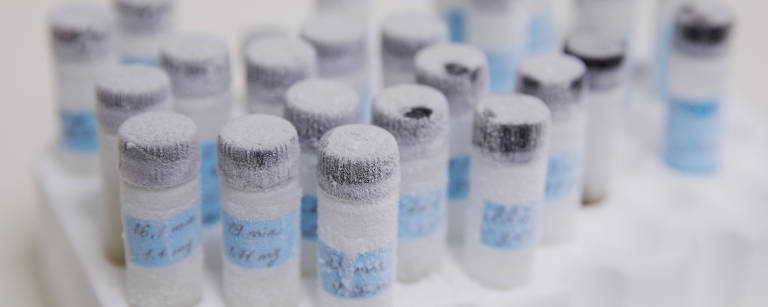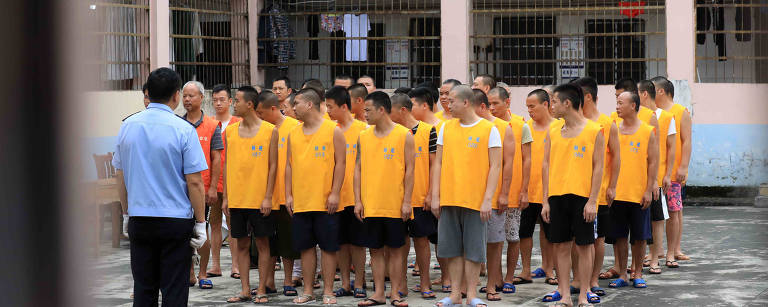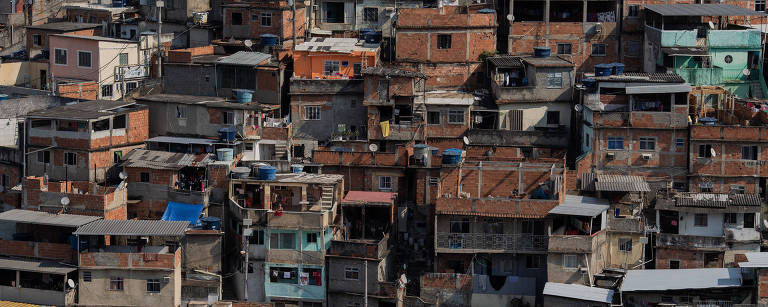
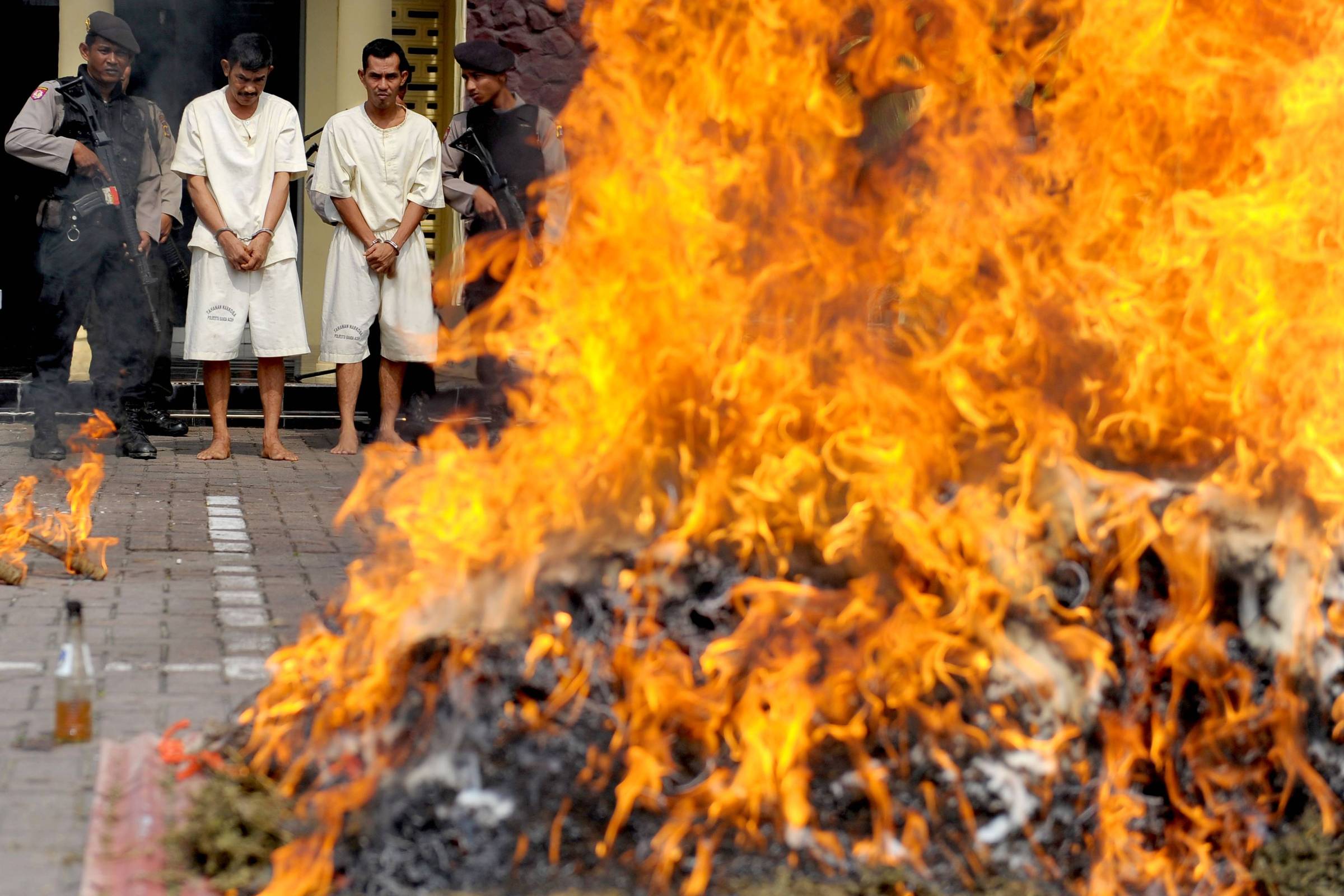
Police burn seized marijuana while arrested suspects watch in Banda Aceh, Indonesia - Chaideer Mahyuddin - Mar.31.17/AFP
Tito, 21, started using meth, called sabu-sabu in Indonesia, to stay awake for many hours. “I worked as a ride-sharing app driver, and to earn a little more, you must always be available,” he said through his lawyer, Yosua Octavian, coordinator at LBH Masyarakat, an organization that offers legal aid. He started using the drug regularly two years ago because it helped him stay energetic and not feel tired.
Last year, he was arrested at a hotel in central Jakarta, the capital. Police beat Tito for hours until he admitted he had 0.4 grams of the drug. His lawyer asked him to be taken to a rehabilitation center. But prosecutors asked him to stay in jail for eight years, claiming he was a drug dealer, and the judge decided on a two-year prison sentence.
Tito is in the Cipinang prison in Jakarta. In September, there were 3,041 prisoners there –although the capacity is 1,136. Cells made for 10 people were being used to house up to 30. “It is a disgrace that a 19-year-old ends up in prison for being a user,” says the lawyer.
Indonesia has one of the strictest anti-drug laws in the world. The government can sentence a person caught with marijuana, ecstasy, cocaine, or methamphetamine for personal use to up to four years in prison or forced rehabilitation.
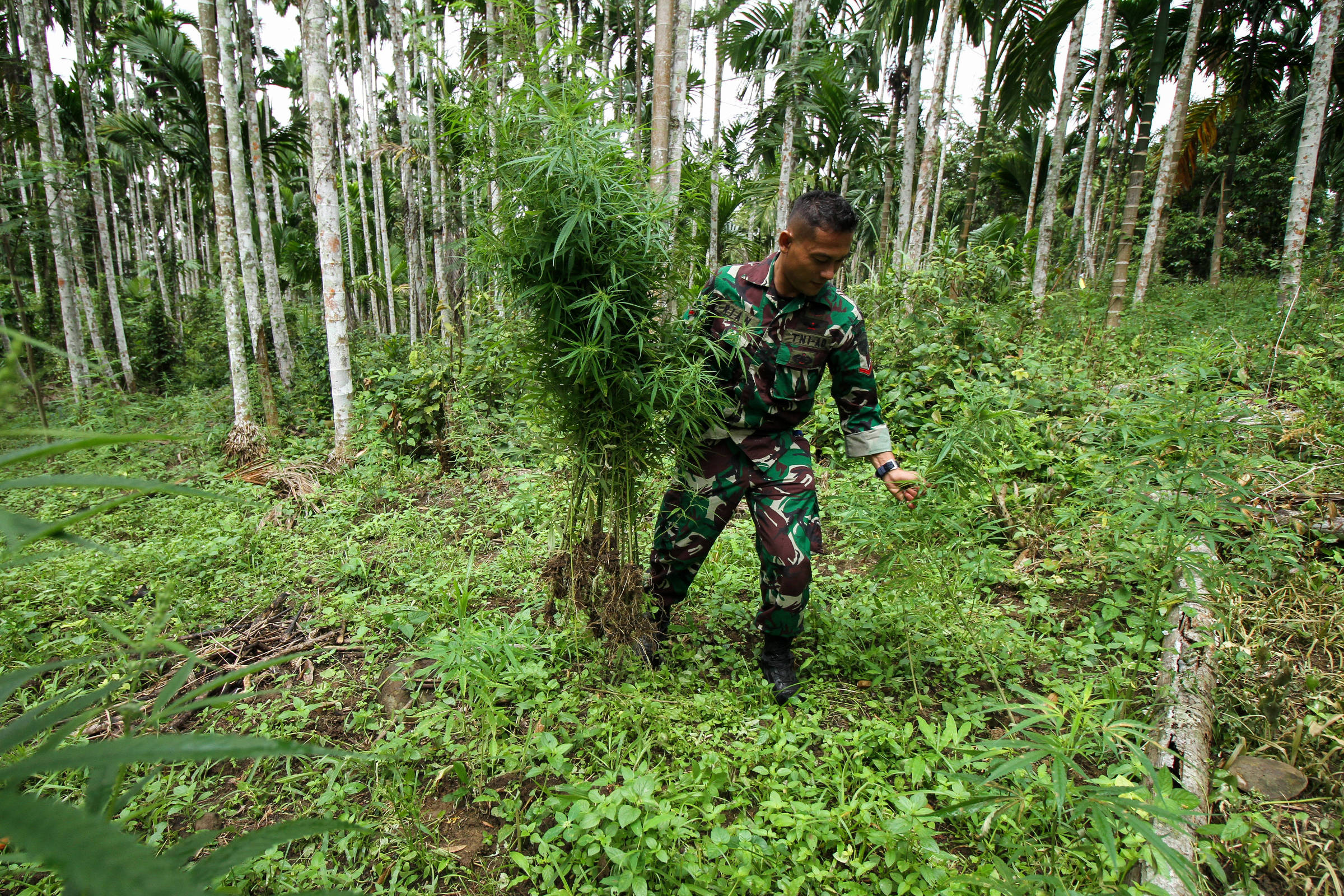
Soldier in operation to destroy marijuana plantation in northern Aceh province - Fachrul Reza - Dec.17.19/Barcroft Media/Getty Images
Parents of underage drug users are mandated to report their children –if they do not, they can face up to six months in prison.
“In practice, the narcotics law does not differentiate between users and traffickers when criminalizing possession. A student caught with a marijuana cigarette can be sentenced to years in prison,” says lawyer Ricky Gunawan, a leading expert on drug policy in the country.
Possession of group 1 drugs, considered to be more dangerous and with greater potential for dependence, can be punished with 4 to 12 years in prison and fines of 800 million to 8 billion rupees (R$ 284,000 to R$ 2.84 million, in a country where the minimum wage is R$ 1,420). Group 1 drugs include marijuana, cocaine, MDMA (ecstasy), methamphetamine, heroin, and others.
If a person has more than 1 kg of marijuana or 5 g of cocaine, for example, they can face life imprisonment. If you are trafficking those volumes, you could be put to death.
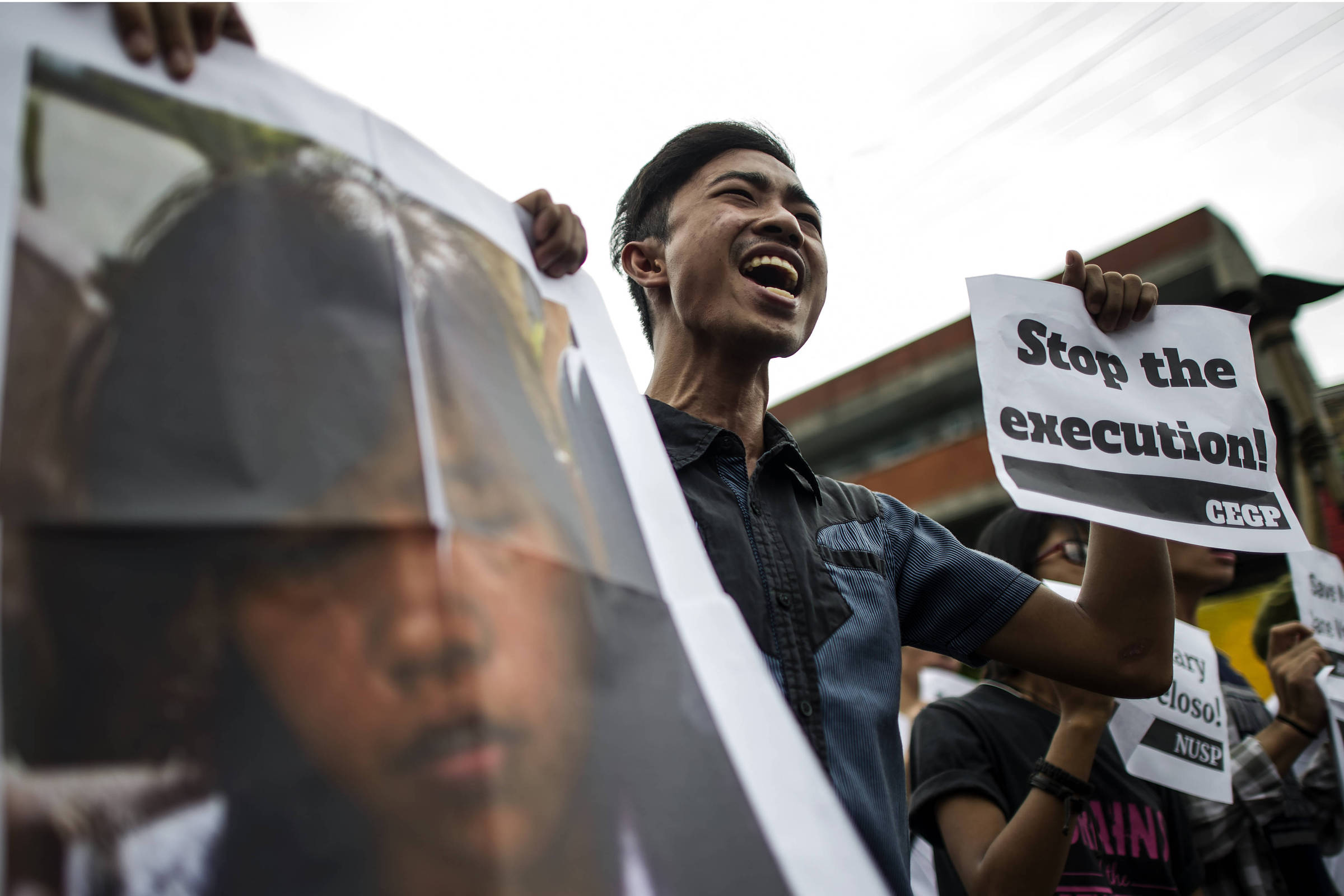
Protest against the execution of Filipina Mary Jane Veloso in Manila, in 2016; she remains jailed in Indonesia - Noel Celis - 13.set.16/AFP
That’s happened to two Brazilians in 2015. Marco Archer, 53, was executed by firing squad in January of that year. He was sentenced to death in 2004, after being arrested with 11 kg of cocaine inside hang glider tubes. Rodrigo Muxfeldt Gularte, 42, was sentenced in April of the same year, after being arrested in 2004 when trying to enter the country with 6 kg of cocaine in surfboards.
The Indonesian government ignored the fact that Gularte was diagnosed with schizophrenia, found in two reports. Lawyer Gunawan assisted in the defense of Gularte.
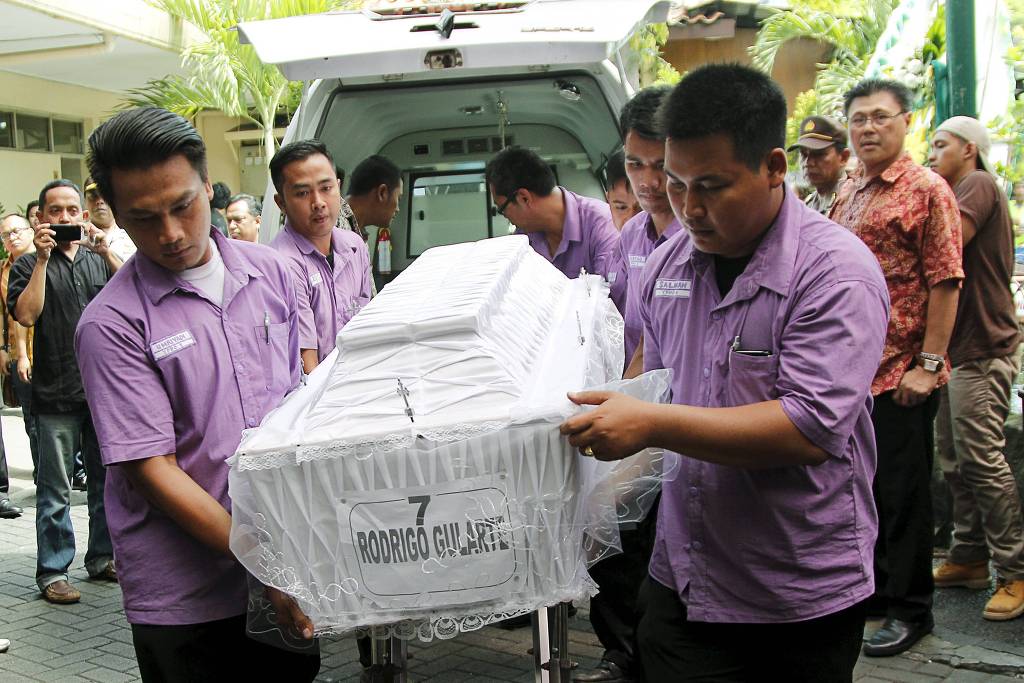
The body of Brazilian Rodrigo Gularte arrives at the funeral home in Jakarta after his execution - Nyimas Laula - Apr.29.15/Reuters
In 2015 and 2016, Indonesia executed 18 people for drug-related crimes. LBHM estimates that there are 413 people on death row, 275 convicted of drug offenses.
According to Reprieve attorney George Havenhand, users should not be tried under Articles 111 and 112 of the narcotics law, which calls for between 4 and 12 years in prison. They should be judged under Article 127, which provides for a maximum sentence of 4 years or rehabilitation.
But in practice, the police find users. “If they cannot afford a bribe, they are more likely to be arrested under Articles 111 or 112,” says Havenhand, author of the study “Reorienting Drug Policy in Indonesia”, published in June.
Wealthy people rarely go to prison, says Otaviano. “The most common method is to release the accused after receiving a certain amount… When someone is arrested and not taken immediately to a police station, the policeman is usually negotiating in the car.”
The draconian policy’s result is the overcrowding of prisons in Indonesia, which can house around 130,000 prisoners, but now hold more than double that.
According to the head of the prison department, the number of prisoners for drug-related crimes rose from 10% of the total in 2002 to 48% in 2019. In 2000, there were about 53,000 detainees in Indonesian prisons. In 2019, there were 269,775, of which 129,820 were convicted of drug-related crimes –and 51,971 (19%) for being users.
Although the legislation allows the user to go to rehabilitation centers, this rarely happens. According to the Indonesian Criminal Justice Reform Institute, in 2016, 94% of those detained for drug-related crimes ended up in prison, while 6% were referred for treatment.
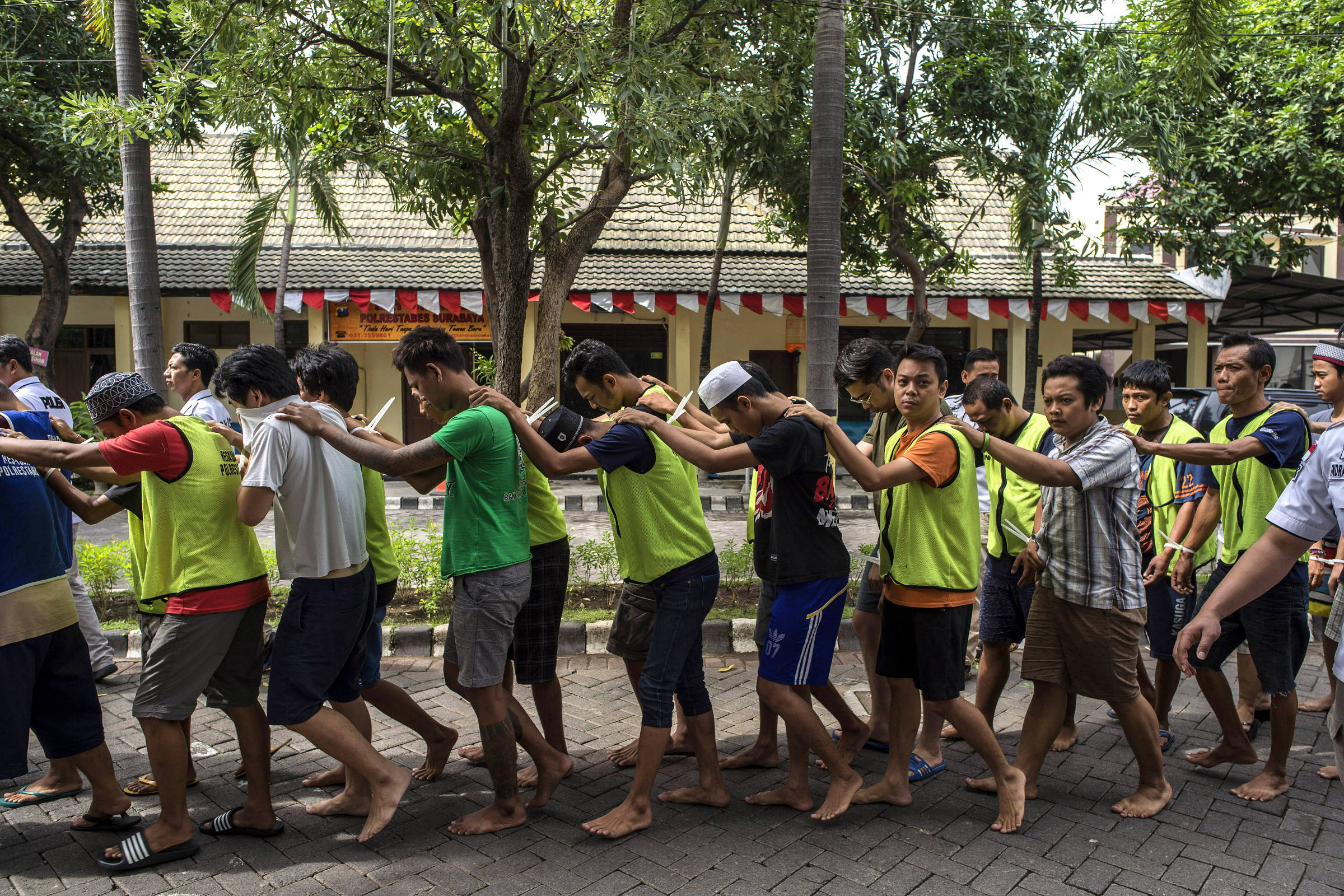
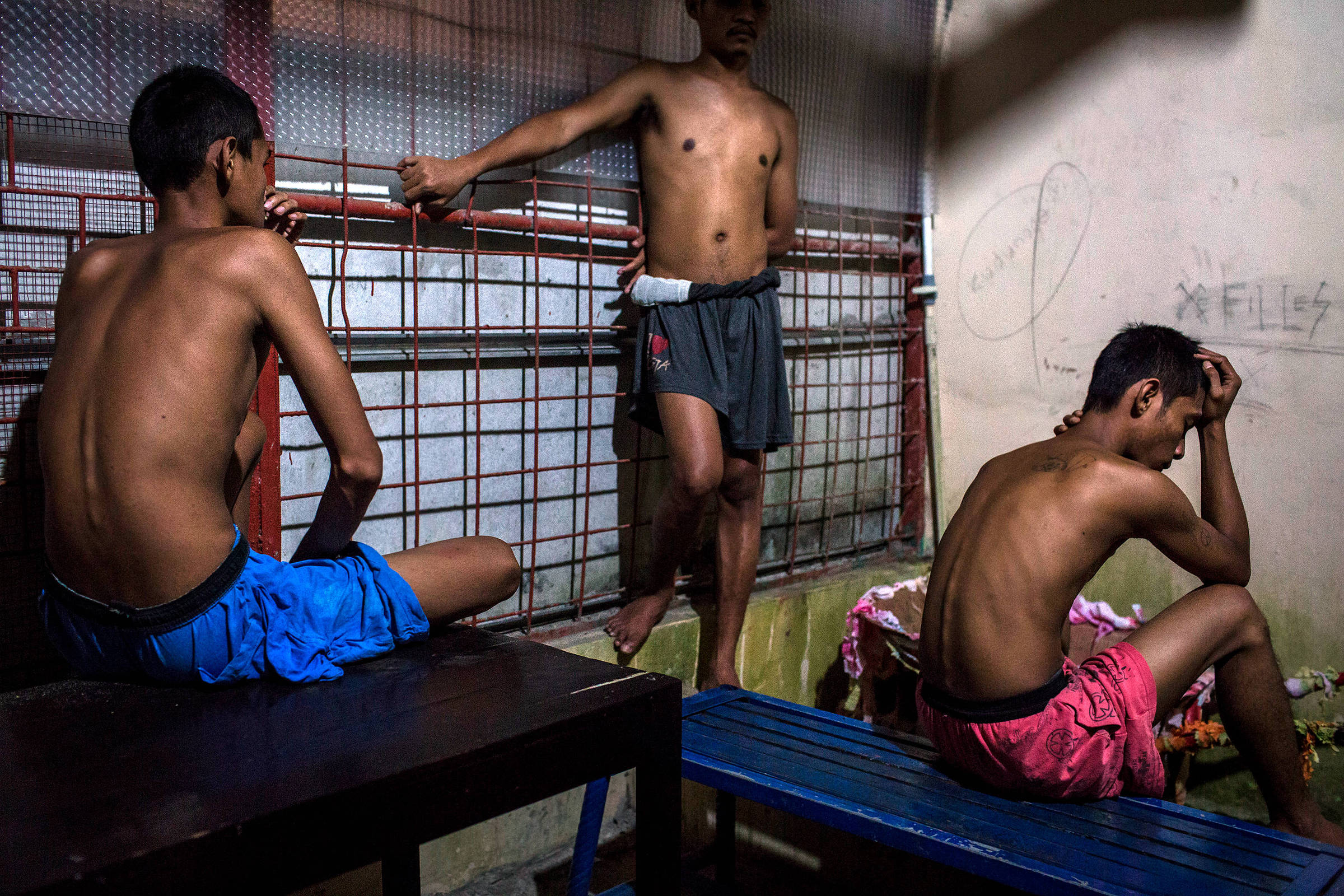
At the top, suspected drug traffickers are taken by the police to be presented to the press in Surabaya; below, drug addiction rehabilitation center in Purbalingga, Indonesia - Juni Kriswanto - Feb.18.20/AFP // Ulet Ifansasti - Sep.16.17/Getty Images
Professor Asmin Fransiska, from Indonesian university Atma Jaya, points out that there are perverse incentives for incarceration. “Police officers and prosecutors earn points [on their performance scores] when prosecutions and investigations end in conviction and imprisonment, not when people are referred for rehabilitation,” says Fransiska.
The spread of HIV is another side effect of criminalization. Indonesia has one of the highest HIV prevalence in the region, concentrated among intravenous drug users. The war on drugs stigmatizes them and creates obstacles to access to treatment and harm reduction, such as the distribution of syringes or methadone, for example. Users fear being arrested for seeking these services.
Even those who escape draconian sentences have not guaranteed access to effective treatment. A minority gets treatment. Most of the centers provide for compulsory hospitalization of 3 to 6 months and abstinence, often without palliative care for the effects of the absence of the drug.
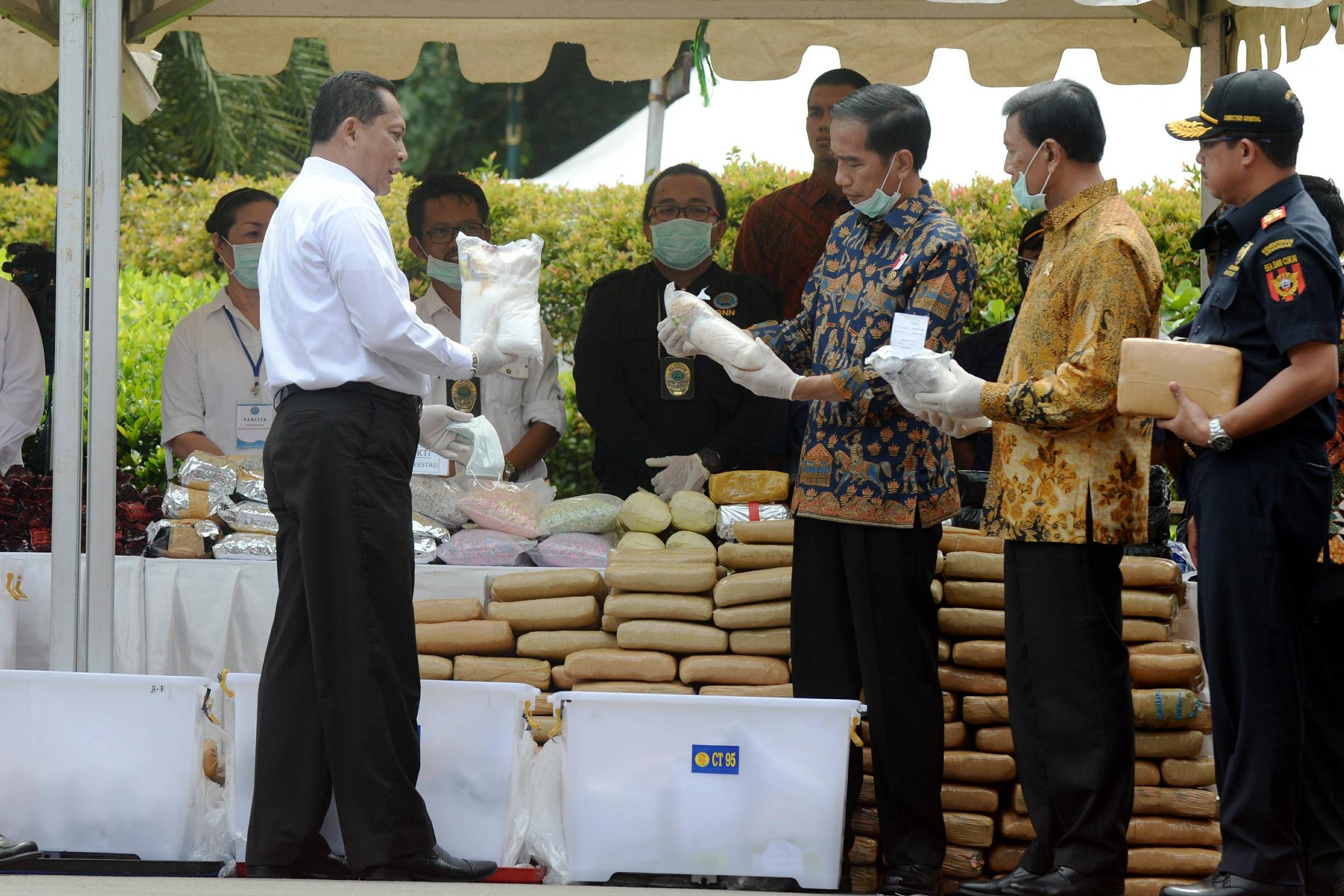
President Joko Widodo (2nd from left) participates in drug destruction ceremony in Jakarta - Agung Kuncahya B. - Dec.6.16/Xinhua
The country’s drug policy is anchored in questionable statistics. In December 2014, President Joko Widodo declared that the country was experiencing a drug emergency, stating that 4.5 million Indonesians were users and that “up to 40 to 50 people per day die”. The figures were from a study by the state anti-drug agency, BNN, and experts criticized it.
Among the errors was the classification of everyone who claimed to have tried drugs as users, for example.
Experts are not optimistic about the possibility of reforming drug policy in the short or medium term. “I don’t think any degree of decriminalization is going to happen in the next five years, it is politically unlikely, it is not among the priorities,” says Gunawan.
The narcotics law is on the agenda for legislation to be discussed by 2024, alongside 40 others. “There is no political gain in defending drug policy reform, while the hard-line, the war on drugs, pays political dividends. There will be an urgent need for reform only when overcrowding in the prison system leads to massive drug trafficking in prisons or riots.”
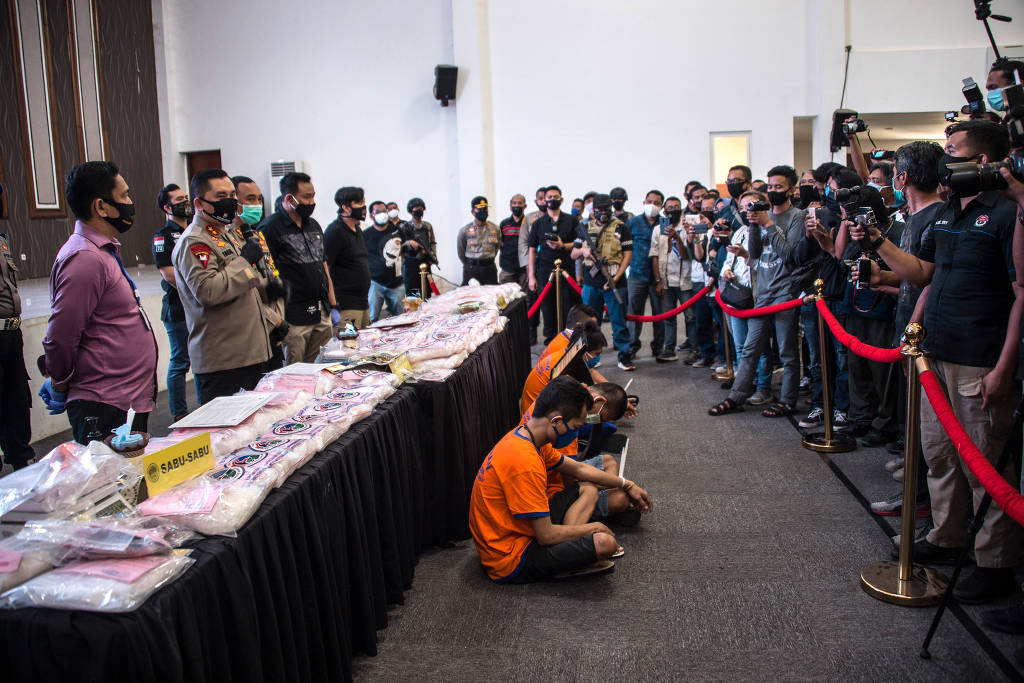
Police present suspected methamphetamine traffickers to the press in Surabaya - Juni Kriswanto - May.12.20/AFP
For Gunawan, the drug war was Joko Widodo’s way of consolidating his power. After being sworn in for his first term in 2014, Widodo faced the first 100 turbulent days, with criticism of ministers and popular discontent over fuel prices. The drug war was a way of showing himself to be a strong, nationalist leader and regaining power.
Hate of traffickers and drugs finds widespread support in society, although there is no research quantifying approval. The Indonesian leader warned that he would be ruthless with drug dealers and that he would not pardon death row inmates. In his first term, he authorized the execution of 18 by firing squad.
Since that time, and even more since 2019, the Islamists’ most conservative wing has started to pressure Widodo and question his religiousness. The emergence of the alleged drug epidemic is one of the few issues that can galvanize conservative and moderate Islamists.
“Everyone within the government and in society is working together to fight drugs, which are our biggest enemy,” said Lukman Hakim Saifuddin, then Minister of Religion.
“In Indonesia, it is very popular to maintain a strict anti-drug policy and be tough on drug traffickers. President Jokowi uses these devices without the slightest shame. It does not matter that it is destroying the prison administration, where half of the detainees are there because of drugs,” says Andreas Harsono, a researcher at Human Rights Watch in Indonesia.
Widodo admitted to having been inspired by the Filipino leader Rodrigo Duterte, whose war on drugs resulted in more than 25,000 deaths, international condemnation, and popularity among sections of the population.
In 2016, 16 people were killed in police anti-trafficking operations in Indonesia. In 2017, Widodo implemented a “shoot in sight” policy –and the death toll increased sixfold to 98.
Nor is the possibility of further executions ruled out. They have not occurred since 2016, but the moratorium is not official. “The pause in executions is circumstantial; judges continue to sentence people to death,” says Gunawan. In 2019, at least 80 received the penalty. “And Widodo can restart executions whenever he wants –and needs to” increase popularity, he says.
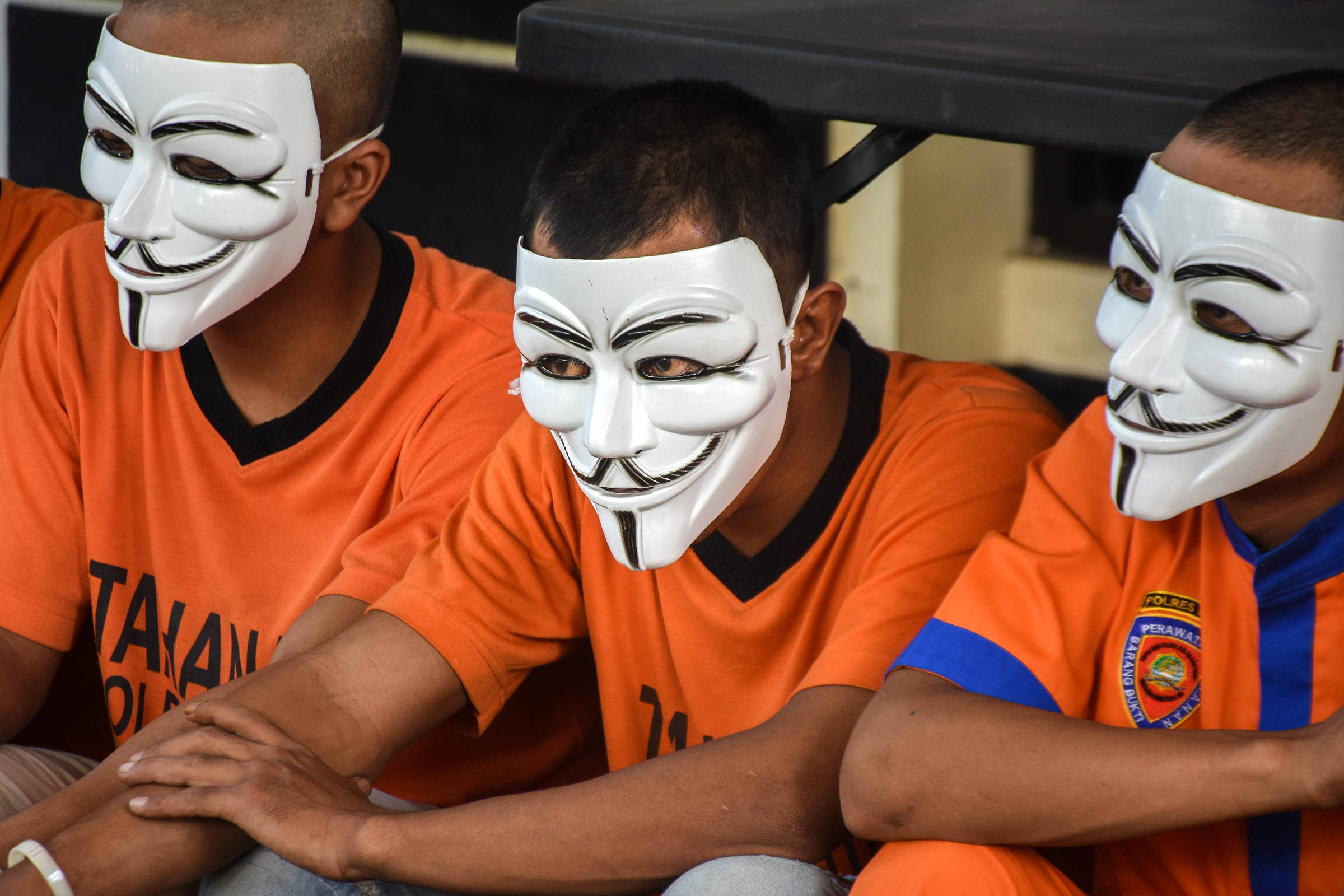
Drug trafficking suspects wearing masks in Batu City, East Java, Indonesia - Aman Rochman - Jan.17.20/NurPhoto/AFP
